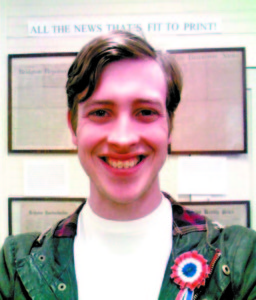In Ye Olden Times: The Dickens Club

By Michael Davis
Assistant Executive Director
Bridgton Historical Society
Hello Neighbors!
For all the unhappiness which is presently keeping us cooped up right now, there are also good elements to come from this. For example, I found on asking around that a great many of my local friends are all finding that a certain element of their lives is once again re-asserting itself. For all we have given up, a treasure is once again being found in the quiet scenes of family life; of dinners eaten together, of family board games, of conversation and dancing, all small but cherished memories, which I believe we shall remember as moments of light, far longer than we shall recall the inconvenience and difficulties of the present.
I turn us now to the Bridgton News of April 9, 140 years ago, when in 1880 a local group of families founded a literary club and put on scenes and musicals for their families. While such a club itself would not be feasible at present, given the occupancy limits, I think their programs contain ample material for any family to draw inspiration from. So if you’re all hunkered down right now and looking for something to pass the time, here’s what they used to do before all our electric distractions. Pull up a chair, dust off the bookshelves, and find a guitar or hang some drapes. In very little time, can you assemble a production which, if it does not equal the theatre in scope, will at least succeed it in the eye of memory.
Here’s this week’s look back in Y e Olden Times:
“One of the most elaborate and delightful literary and musical entertainments ever enjoyed in this village was given at the second Meeting of the Dickens Club, at the residence of Mr. P.P. Burnham, on Monday evening last, and which deserves more than casual mention. The author chosen, was Longfellow. The audience, of the number of forty, were assembled in one parlor, while the entertainment was presented in the other, the sliding doors being drawn at the close of each scene. The Committee for the evening were Mrs. S. Gibson, Mrs. P.P. Burnham, and Miss Kathie Nichols, who arranged the following programme:
An opening Trio, for violin, cornet and piano, Mr. A.W. Gibson, Mr. C.H. Mackay, and Mrs. Burnham.
Biographical sketch of Longfellow, Mrs. Gibson.
Reading of a section from “Evangeline,” Miss Mary M. Dennet.
Picture of Evangeline, Mrs. B.W. Stevens.
This was a vignette, artistically arranged as to frame the surroundings, that was very effective, the resemblance of Mrs. Stevens to the accepted portrait of the character being very apparent.
Four Tableaux from Hiawatha. Hiawatrah, Mr. Mackay; Nokomis, Mrs. Gibson; Minnehaha, Miss Annette G. Gibbs. Scene 1, Minnehaha emerging from her wigwam with bow and arrow, posing as gracefully as a huntress. Scene 2. Hiawatha’s Wooing – “I will follow you, my husband.” Scene 3. “In the wigwam with Nokomis,” “She was lying the beloved,” “she, the dying Minnehaha.” Scene 4. The Death of Minnehaha;” a closed tent – silence – broken by a distant singing of the song, with guitar accompaniment, by Miss Nichols and Mrs. Burnham, which was very beautiful.
Song, “The Day is Done” (Longfellow) Miss Nelle I. Gibbs, who sang, in response to an enthusiastic encore, “Beware,” by the same author.
A Poem, Longfellow’s last, Mrs. Gibson.
A Tableau Charade, in four scenes from the “Sage of King Olaf.” Queen Sigrid, Miss Nichols; Astrid, the Abbess, Mrs. Gibson; King Olaf, W.L. Haskell; a Goldsmith, Frank Gee. Scene 1. Queen Sigrid the Haughty and the Goldsmith “The ring is of copper and not of gold.” Scene 2. Queen Sigrid and King Olaf “And he struck the queen in the face with his glove!” Scene 3. The Convent of Drontheim. Altar — with lighted candles – Astrid approaches. Scene 4. “Alone in her chamber knelt Astrid the Abbess, at midnight.”
The beauty of the tableaux was enhanced by colored lights, and the costumes in all were beautiful and appropriate; Miss Nichols was lovely, in the white robes of the Queen; and Miss Gibbs was a charming Minnehaha.
The roll was called by Mrs. Dr. Kimball, the members responding with a quotation, which closed the exercises of the Club. An hour was spent in conversation and music, Mr. Gibson playing the beautiful “Spanish Retreat” upon the guitar very finely, and Miss Nichols again sand the “Death of Minnehaha.” Every one was delighted with the entertainment; and many thanks are due the Committee for their happy selections. Next meeting at Dr. Haskell’s residence.”
Till next time!

